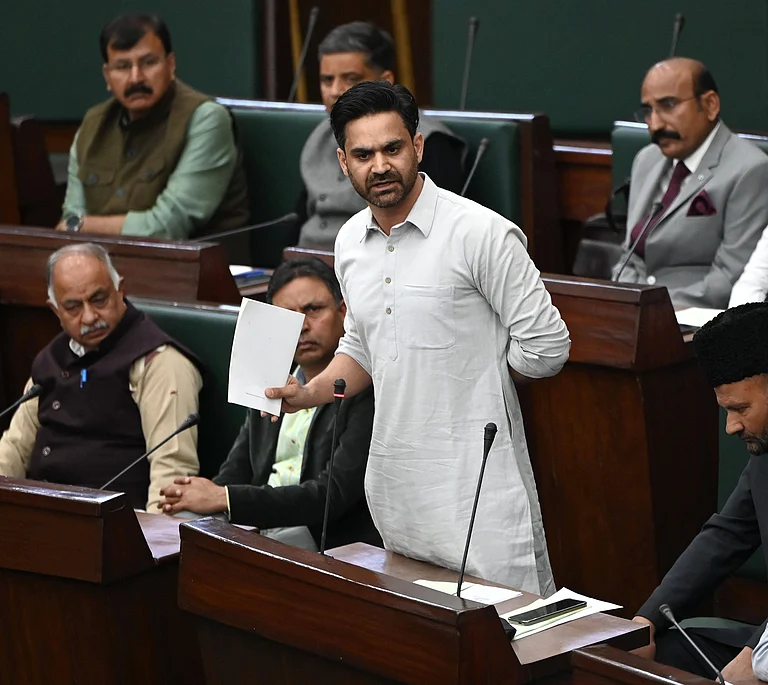The nice folks at Outlook wanted me to write an article on how the landscape of “professions” has been changing in India. And they said they would pay me per word. You might notice that I’ve already ripped them off with this 48-word introduction. So let’s quickly start.
I passed my tenth standard in 1984. So my impressions about the career options that people had earlier is derived mostly from movies.
From what I can gather, the 60s and 70s were simple times.
Professions were broadly divided into two categories. Industrialists, businessmen, smugglers & black-marketers formed one group. Honest, upright, poor, virtuous, government employees formed the other. Members of the first group acquired buildings, property, bank-balances, bungalows and cars. Members of the second group had mother.
What you became, was more or less decided by birth. Or sometimes, on the basis of who adopted you when, after your parents were killed, you unfortunately got separated from your brother.
Some indicators:
If you had a bar at home and could share a bottle of VAT69 whisky with your father, you would become a rich businessman.
If, however, your mother was constantly on the sewing machine, you would most probably take up a profession that involved a uniform – a cop, the armed forces or a safari-suit clad district collector.
And if you possessed a detachable mole, you could oscillate between the two groups.
Things changed a bit in the decade or two after that. Big tax-funded colleges and universities came into their own. They were called “institutes of national importance” because they were quite important to nations like USA & UK. So even if you came from the sewers (i.e. a house where mother was sewing), you still had a chance because education could transform your life and move you up the social ladder.
The simple 60s thus gave way to the engineering 80s. On which I can speak from personal experience.
Till class X, the education system I went through primarily considered the brain to be a plastic bucket that had to be filled. Mug by mug. It was after this, that one had to make a few choices.
If you were the son of a small businessman, you had to go for the commerce stream and start helping Papa in the evenings. So during the day, you were taught about double-entry bookkeeping, while in the evenings you were taught no-entry, non-book-keeping.
If you could chop up a frog without remorse, you would go on to become a doctor. Perhaps, because this demonstrated that you were okay with your patients croaking.
The rest, all the rest, took a crack at engineering. The crème de la crème (as the professors called it) went to an IIT or a premier institute. The crème de la rest-of-the-milk went to various other local engineering colleges. The non-creamy layer also had a chance at engineering (at colleges like Genius College of Technology) provided their parents coughed up some capitation fees. (Paying capitation fees was a sound investment if the NPV of the increase in market value of a person, read dowry, exceeded the fees paid.)
Engineering was such a fad that it spawned a massive secondary industry with tutorial colleges offering preparatory courses ridiculously early. It’s a wonder that no one started an Abhimanyu Tutorials that trained children while they were still in their mother’s womb. And students flocked to these courses because a disproportionate number of people wanted to be engineers. A typical Ambassador car those days, would contain one lousy engine and seven prospective engineers going for their coaching class.
Law was a viable option if you were okay with calling people Milord, wearing black coats in summer and if you couldn’t get through to any engineering college. In Law Colleges students acquired a firm grasp of the law. By taking it into their own hands. But there was still an air of respectability about it.
The only path to success those days was study & effort. For years. Multiple degrees. Simply speaking, the more degrees you had, the hotter you were.
And now we come to today. True, there is a boring majority that still studies Mechanical, Civil, Chemical or Metallurgical Engineering (and then becomes software professionals) but the action is in the new exciting professions. There has been an explosion of options. Every skill is monetizable. Every eccentricity has a buyer. Every activity is a potential profession, and every talent has a reality show. Here’s a sample guide that may help parents spot their offspring’s future vocation
Your child…
…ignores you when asked to do something – Flight Crew
…keeps interrupting when adults are talking – News Anchor
…stays up late and goes to school bleary eyed – IPL Player
…insists on lighting the candles during a power cut – Social Activist
…beats up all the kids in the neighbourhood – Collection Agent
…wakes you up at night with inane requests – Call Centre Executive
Actually, the list is endless. As a popular Tamil film personality would say – You can reach altitude with just aptitude and attitude. So parents can now give latitude. For this we should have gratitude.
Seriously, this opening up of career options has meant that there is a lot less pressure on a child to achieve academic excellence. And as parents figure this out, life, for a child, has become less of a journey and more of an exploration. Which is great.
Ramesh Srivats is the founder of Ten Ten Ten, a company that helps creates brands in the digital age. He can be found at rameshsrivats.net and twitter.com/rameshsrivats


























